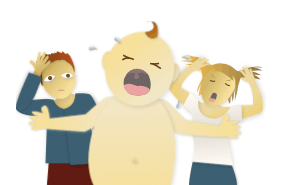For Parents
"About Babies" Worksheets
"About Mothers and Fathers" Worksheets
Understanding Baby's Crying

A baby’s crying is very distressing to parents. It is not known why babies sometimes cry for long periods without being easily comforted. However, babies vary in the amount and intensity of crying in their first year.
Parents are often told to trust their intuition in recognising differences in their baby’s cries and to decide what these mean. However, it is actually very difficult to identify different cries and most parents assume that the baby is either hungry or in pain.
Parents often don’t know what to do to quieten and soothe their baby and can lose confidence very quickly.
Here are some things to remember:
A certain amount of crying is to be expected
The total time a baby cries each day increases gradually and peaks at about six weeks of age
It can be tempting to try to distract a crying baby, but it is often better to try quiet soothing
It is helpful for fathers and mothers to have a number of ways to soothe their baby, not just by offering a feed
Babies cry more when they are tired, have not had enough sleep, or are over-stimulated
Well-slept babies cry much less and are more easily comforted than babies who have not had enough
|
Learning from your answers
Parents often don’t know what to do to quieten and soothe their baby and can lose confidence very quickly. Here are some things to remember:
- If babies are well fed and are not currently sick, prolonged crying might be related to being over-stimulated and over-tired.
- If your baby cries for periods of longer than five to ten minutes and your current soothing strategies do not seem help, perhaps your baby needs quietness and sleep.
- Try using the Feed-Play-Sleep routine which is described on the next page.





